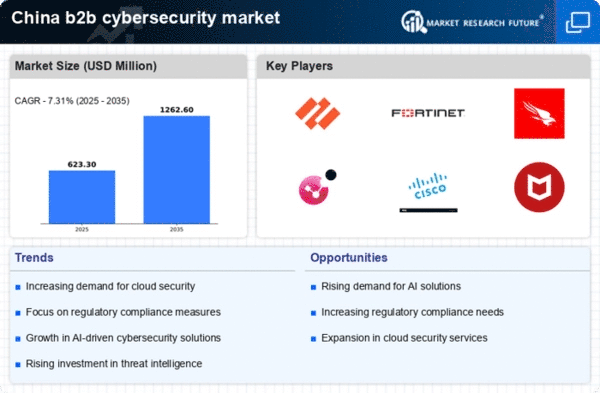Rising Cyber Threat Landscape
The b2b cybersecurity market in China is experiencing a surge in demand due to escalating cyber threats. With cyberattacks becoming increasingly sophisticated, businesses are compelled to invest in robust cybersecurity measures. Reports indicate that the number of cyber incidents in China has risen by over 30% in the past year, prompting organizations to prioritize cybersecurity. This heightened awareness of potential threats is driving the adoption of advanced security solutions, thereby propelling growth in the b2b cybersecurity market. Companies are now more inclined to allocate substantial budgets towards cybersecurity infrastructure, which is projected to reach approximately $20 billion by 2026. As a result, the The b2b cybersecurity market is likely to witness significant expansion. Organizations are seeking to safeguard their digital assets against evolving threats.
Regulatory Compliance Pressures
In China, the b2b cybersecurity market is significantly influenced by stringent regulatory compliance requirements. The government has implemented various cybersecurity laws and regulations aimed at protecting sensitive data and ensuring the integrity of information systems. Organizations are increasingly required to adhere to these regulations, which often necessitate the deployment of comprehensive cybersecurity solutions. For instance, the Cybersecurity Law mandates that companies implement measures to protect personal information and critical infrastructure. This regulatory environment is driving demand for compliance-focused cybersecurity solutions, as businesses strive to avoid hefty fines and reputational damage. The market for compliance solutions within the b2b cybersecurity sector is expected to grow at a rate of 15% annually, reflecting the urgency for organizations to align with regulatory standards.
Digital Transformation Initiatives
Ongoing digital transformation initiatives across various sectors in China are driving the b2b cybersecurity market. As organizations increasingly adopt cloud computing, IoT, and AI technologies, the need for robust cybersecurity measures becomes paramount. Digital transformation introduces new vulnerabilities, making businesses more susceptible to cyber threats. Consequently, companies are investing heavily in cybersecurity solutions to protect their digital assets. It is estimated that the b2b cybersecurity market could grow by 20% annually as organizations seek to secure their digital transformation efforts. This trend indicates a shift towards integrating cybersecurity into the core of business strategies, ensuring that security measures evolve alongside technological advancements.
Emergence of Cyber Insurance Solutions
The emergence of cyber insurance solutions is shaping the b2b cybersecurity market in China. As businesses face increasing cyber threats, many are turning to cyber insurance as a risk management strategy. This trend is indicative of a broader recognition that cybersecurity is a shared responsibility, and insurance can provide a safety net against potential losses. The cyber insurance market in China is projected to grow significantly, with estimates suggesting a compound annual growth rate of 25% over the next five years. This growth is likely to encourage organizations to invest in cybersecurity measures, as insurers often require businesses to implement specific security protocols to qualify for coverage. Consequently, the integration of cyber insurance into risk management frameworks is expected to bolster the b2b cybersecurity market.
Increased Awareness of Cybersecurity Risks
There is a growing awareness of cybersecurity risks among businesses in China, which is significantly impacting the b2b cybersecurity market. As high-profile data breaches and cyberattacks make headlines, organizations are becoming more cognizant of the potential repercussions of inadequate cybersecurity measures. This heightened awareness is leading to a proactive approach towards cybersecurity, with companies investing in training and awareness programs for their employees. Furthermore, businesses are increasingly recognizing that cybersecurity is not merely an IT issue but a critical component of overall business strategy. This shift in perception is likely to drive the b2b cybersecurity market, as organizations allocate more resources towards comprehensive cybersecurity solutions to mitigate risks and protect their reputations.
















